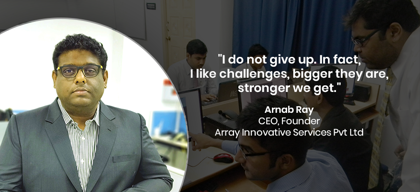10 things entrepreneurs should know about patents

Legal & Compliance
265 week ago — 8 min read
Background: A patent is undoubtedly the most sure shot way of protecting you unique innovation. This legal shield can prevent your idea from being used illegally by your competitors. However as someone new to it, you should know a few important things about patents. Srinivasan Raman in his previous article shared ways to create strong pharmaceutical trademarks. In this article he shares ten things entrepreneurs should know about patents.
You are an entrepreneur with an innovative product that you are ready to launch into the market. It is likely that you are already familiar with the race to setting up a model, fabricating it and making it available in the market before someone else claims a right over it. The process of getting your product patented before anyone else does is stressful indeed.
Without a patent, your unique invention is in continuous danger of being infringed upon by your contender. Hence, getting the licensed innovation security is significant. In light of that, here are 10 key things that any business visionary or innovator needs to keep in mind:
1. What is patent?
As indicated by Investopedia, a patent is a ‘government permit that gives the holder restrictive rights to a procedure, outline or new development for an assigned timeframe.’ By setting up a patent, the patent holder is shielded from different substances encroaching upon their licensed innovation.
Theoretically, without a patent, another creation could be figured out, recreated, and exchanged by another organisation with more assets, adequately driving the first designer out of the commercial centre.
While applying for a patent, business visionaries and innovators must note what kind of patent they are applying for. In the US, there are three distinct groupings of licenses, known as utility licenses, outline licenses and plant licenses.
2. A ‘thought’ can’t be patented
As extraordinary as a thought might be, it can't be patented. The invention has to be produced or an application containing the invention must be filed.
Generally, however the prerequisites fluctuate from nation to nation, patent experts require that keeping in mind the end goal to be licensed, thoughts ought to be organised as all the more a substantial resource or plan, either through the improvement of a model or however point by point illustrations and depictions.
3. Licenses are country-sensitive
There are various diverse patent specialists, and no single representing body can issue licenses that are upheld around the world. For instance, licenses in the United States are issued by the United States Patent and Trade Office while licenses in the United Kingdom are taken care of by the Intellectual Property Office.
Through the Patent Cooperation Treaty, one can start the patent recording process with approximately 145 taking an interest countries, albeit in the long run there are extra expenses and procedures necessitated that one must consider to settle the coveted licenses.
4. Patents are of different types
While applying for a patent, business visionaries and innovators must note what kind of patent they are applying for. In the US, there are three distinct groupings of licenses, known as utility licenses, outline licenses and plant licenses.
For example: In China, there are two kinds of licenses, development licenses and utility model licenses.
Also read: Patents: Advantages & obstructions
5. The first to file a patent typically wins
Since the death of the America Invents Act, for all intents and purposes each nation on the planet currently chips away at a first-to-document framework for licenses, instead of a first-to-imagine display. This means in case of different candidates petitioning for a similar patent, the patent will go to whoever recorded the application first.
6. Licenses can take a long time to be granted
Endeavoring to acquire a patent is certifiably not a decent movement for the individuals who need persistence. Despite the fact that timetables change from element to substance, as indicated by one source, “the normal time it takes to acquire a patent from the (US) patent office as of now is around 32 months or a little under 3 years."
7. Licenses have to be globally unique
Preceding acquiring the cost and committing the time required to apply for a patent, it is exceedingly fitting to direct an overall look for comparable licenses, to guarantee that there is definitely not a comparable item or idea as of now with a patent or a patent pending. The USPTO (United States Patent and Trademark Office) alone has issued more than 8 million patents since its beginning.
8. Licenses cost money to apply for
Before documenting a patent application, creators ought to consider the reiteration of expenses related with the procedure. Beside simply the application expense itself, there are related administrations to be viewed as, going from the cost of an expert overall patent inquiry and feeling, to lawyer charges, to help with plan illustrations or model assembling, and that’s only the tip of the iceberg.
9. Patent legislation keeps changing
Because of the pace at which innovation and advancement happens in the present business, rules and laws are always showing signs of change. Business people and designers should stay informed concerning ongoing changes with global bodies, for example, the World Intellectual Property Organization (WIPO).
Extra, singular nations routinely draft new enactment that includes patent law, for example, the proposed Innovation Act that is under thought in the United States.
10. Be aware of patent trolls
Patent Trolls are people or entities who utilise patent laws to make by and large unimportant cases about patent encroachment, ordinarily with the objective of separating a settlement from a litigant who might lean toward not to acquire the expenses and time required to battle the case.
Apple and ProView Technologies had a notorious patent debate in 2012 at which time the production Uproxx got out the two gatherings on their fairly ‘trollish’ conduct as for licenses.
While beneficial for many, patents come with their drawbacks. Half knowledge is worse than no knowledge so make sure you read Patents, copyrights and trademarks: The double edged swords which throws light on the advantages and disadvantages of patents.
But here are our closing thoughts: Ask, ask and ask questions. There are no silly questions. Do your own thorough research before paying for professional research and patent application. If you want to be a developer, business entrepreneur with a unique idea or an inventor – you can do it! If you won’t, some one else will!
Also read: Trademark your brand to safeguard your brand
Image courtesy: shutterstock.com
To explore business opportunities, link with me by clicking on the 'Connect' button on my eBiz Card.
Disclaimer: The views and opinions expressed in this article are those of the author and do not necessarily reflect the views, official policy or position of GlobalLinker.
Posted by
Srinivasan RamanFounder of 4A IP Solution, has handled various verticals in business development with India’s topmost brands and worked in a lead role for multiple launches in India and...
Network with SMEs mentioned in this article
View Srinivasan 's profile
SME Inspirations
Other articles written by Srinivasan Raman
How to create strong pharmaceutical trademarks
278 week ago
Most read this week














Comments (1)
Please login or Register to join the discussion